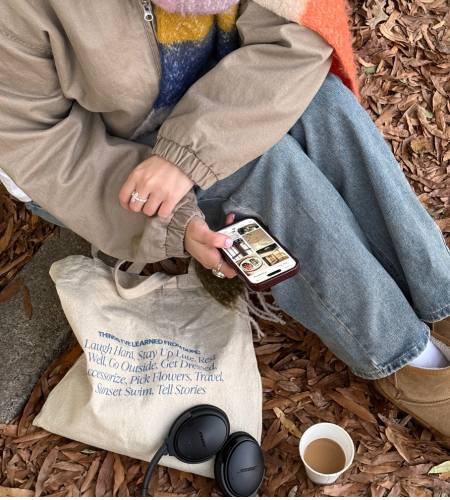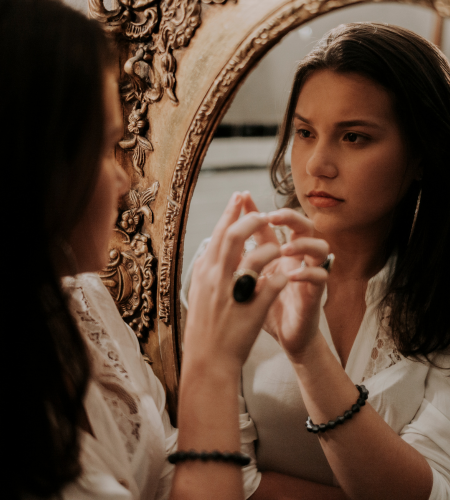
It can be tough to be kind to yourself when things are going wrong. You might feel like you don't deserve it, or that you're not good enough. But identifying ways to be kind to yourself, especially when life throws you a curve ball, is one of the most important things you can do for your wellbeing.
Picture this: You're having a really bad day. Everything seems to be going wrong and you just can't catch a break. You feel overwhelmed, stressed, and like you're about to burst. What do you do?
Option 1: Allow your inner critic to call you lazy. Tell yourself that you’re never going to make it, and that you’re worthless.
Option 2: Accept your overwhelm in the moment, take a deep breathe, and remind yourself you can handle it. You take a break from what you’re doing, and return when you have a clear mind and can reassess the situation with a fresh perspective.
When seeing it spelled out like this, it’s obvious that option 2 is a healthier option, yet option 1 is what most of us currently do without realizing it.
The first time I realized I was in the habit of option 1, I was stressed out with work. I felt like I was falling behind and that I wasn't good enough. The stress was bad, but the worst part was that I was beating myself up about it. I would tell myself things like, "You're such a failure. Why can't you just get it together?" It made me feel even worse and only added to my stress.
I wish someone had told me sooner how important it is to be kind to yourself, and even more, I wish someone had told me how to be kind to myself. It took me a while to learn how to break the cycle of self-criticism, and the more gentle I was with myself, the less stress I felt.
If you want to live a happier life, cope with life’s stresses, or handle setbacks, the key is to learn ways to be kind to yourself.
If you're struggling with this, you're not alone! In this article, we'll discuss some of the challenges of being kind to yourself, and offer 8 ways to be kind to yourself with practical tips and action steps.
Why it’s important to be kind to yourself
When you’re kind to yourself, you’re more likely to be kind to others. That’s because when you have a positive outlook on life, you see the good in people and situations. And, when you feel good about yourself, you spread that positive energy to those around you. It’s like a positivity loop!
Additionally, being kind to yourself helps reduce stress and anxiety. When you take care of yourself emotionally and mentally, you’re better able to cope with stressful situations and handle setbacks. So when life throws that inevitable curveball, it doesn’t feel like a disaster.
Most importantly, self-kindness leads to increased self-esteem and confidence. Too often, we focus on our faults and shortcomings, beating ourselves up for things that are out of our control. This negative self-talk can lead to decreased self-esteem and confidence. Instead when you’re kind to yourself, it shows in your attitude and behavior. You are more accepting of yourself. You forgive yourself for your mistakes and focus on your positive qualities. By showing yourself some compassion, you can increase your self-esteem and become more confident.
As a result of all of the above, you'll be better able to achieve your goals and live a happier, more fulfilling life.

Why is it hard to be kind to myself?
Many of us find it difficult to be kind to ourselves, and that partially has to do with the factors we experienced in childhood. And the unfortunate truth is that, it’s easier to be hard on yourself. We live in a world that's always telling us we could be doing better, whether it's in our careers, our relationships, or our physical appearance. We're bombarded with messages about how we're not good enough, and as a result, it can be tough to silence the critical voice in our heads.
One of the main reasons it’s hard for us to be kind to ourselves is simply because we don't know how. We were never taught how to do it. If our parents weren't kind to themselves, then we were never given good examples of how to either. It can be tough to learn how to be kind to yourself when you don't have any role models.
Another main challenge we have when it comes to being kind to ourselves is that we don’t feel like we deserve it. But the fact is, we are all doing the best we can. And that's good enough.
It’s important to remember that you are your own worst critic and that you deserve compassion and understanding, just like everyone else. So cut yourself some slack. Be gentle with yourself. Embrace your imperfections and celebrate your victories, big and small. And remember that you are just human, flaws and all.
8 Ways To Be Kind To Yourself
- Give yourself permission to be imperfect
- Be gentle and forgiving with yourself
- Accept your feelings, even the negative ones
- Take care of yourself both physically and emotionally
- Spend time with people who make you feel good
- Show yourself love
- Develop positive self talk
- Be patient with yourself
Give yourself permission to be imperfect
Being imperfect is perfectly human.
We make mistakes.
We cry.
We feel pain.
We hurt others.
We get angry.
We feel scared.
We feel sad.
We doubt ourselves.
We let others down.
We are not perfect, and that is okay. When it comes to being kind to ourselves, it is important to accept that all of the above makes us human.
There will be parts about ourselves that we love, and there will be parts of ourselves that we hate. Accepting all parts of ourselves, and letting go of the need for perfection is an important step on the road to self-compassion.
Actions steps to embrace your imperfections
- Make a list of all of the ways you think you’re “imperfect”
- Go through your list and write 2-3 positives about each of those imperfections
- Next time your inner critic wants to put you down for your imperfections, recall the positives of that trait instead of beating yourself up. Be intentional about it. Actually say to yourself, “I’m lazy, I just know when I need to rest”

Be gentle and forgiving with yourself
It's a part of life, we all make mistakes, and we all have moments where we don’t show up as our best selves. And that's okay!
What's not okay is dwelling on those mistakes, letting them eat away at us until they control our every thought. That’s not living, and it’s not healthy to overthink things from the past in that way. This is often an attempt to cope with the painful emotions attached to the mistake which is unhelpful because it keeps up stuck in a world of pain and self-doubt.
Try not to dwell on past mistakes by reminding yourself that making mistakes is a part of life. When we do mess up, it is important to be forgiving and kind to ourselves – otherwise, we will only add to our own suffering.
Instead of adding to our suffering, focus on the present and learn to be gentle and forgiving with yourself. Doing this includes not criticizing or judging ourselves harshly, and being patient with ourselves as we learn and grow.
Try to remember that making mistakes is a natural part of life – it's how we learn and grow as people. When you can use each mistake as a lesson, your mistakes end up being teachers that lead you into a better version of yourself.
When you think about it this way, your mistakes are what make you, you.
Actions steps to forgive yourself
Repeat these affirmations to yourself as often as needed.
- I am human.
- I acted in the best way I was capable of in that moment
- I have grown as a person
- I am grateful for increased insight and opportunity to make a better choice from now on
- I accept this about myself
- I allow myself to be at peace with this
- I forgive myself
Accept your feelings, even the negative ones
We all have feelings, and sometimes they can be tough to deal with. Maybe you're feeling sad because you're going through a tough time, or maybe you're angry because someone did something that hurt you.
Our feelings are a natural and important part of who we are. It's normal to feel a range of emotions, from happiness and love to anger and sadness. And it's okay to feel uncomfortable emotions like anxiety or envy.
In fact, it is essential to accept all of our feelings, both the positive and negative ones. Acknowledging your feelings is an important step in managing them in a healthy way and one of the most important ways to be kind to yourself.
If we try to bottle up your emotions or ignore our negative feelings, they will only become stronger. If you push them away, they can come out in unhealthy ways, like lashing out at others or turning to substances to numb the pain. But if you're able to name your feelings and understand where they're coming from, you can start to deal with them in a more constructive way.
When you take the time to deal with your feelings, you'll find that they lose their power over you and become much easier to handle. So next time you're feeling down, or angry, or scared, take a deep breath and give yourself permission to feel whatever it is you're feeling.
Instead of beating yourself up, use that energy to focus on learning to cope with the uncomfortable feelings- whether that's reaching out to a friend or family member for support or deep breathing exercises.
Whatever you're feeling, it's important to acknowledge it and give yourself time to process it.
Action steps for accepting your feelings
Learn how to process your emotions in a healthy way following the steps below:
- Notice the emotion without judgment
- Acknowledge the emotion
- Accept the emotion
- Take action (if needed)
- Let go
If you’re new to processing your emotions, here’s a good resource about observing and accepting your emotions.

Take care of yourself both physically and emotionally
Being kind to yourself is knowing that you are worth the time and energy it takes to take care of yourself.
Taking care of yourself looks different for everyone, and it doesn't matter what you do as long as you are maintaining your health and well-being.
From a physical standpoint, take care of your physical needs by eating healthy foods, exercising regularly, and getting enough sleep. (Taking care of yourself is also allowing some indulgences here and there, too!).
Emotionally, taking care of yourself includes setting aside time for activities that make you happy, spending time with people who make you feel good, and setting boundaries. Make sure your emotional needs are met by setting time aside for relaxation, and frequently checking in with yourself to see how you’re feeling.
When you make a point of being kind to yourself, you nurture your mind and body, making it easier to cope with stress and adversity. As a result, you'll not only feel better, but you'll also be better equipped to handle whatever life throws your way.
So go ahead and give yourself a little TLC today - your body and mind will thank you for it!
Action steps to take care of yourself
- Make 3 columns on a piece of paper and label them: Physically, Emotionally, Mentally
- Use the image below and make a list of all of the ways you can start to take care of yourself
- Choose 1 thing from each bucket to focus on a day

Spend time with people who make you feel good
When you think of ways to be kind to yourself, I’m sure you think of things like taking a relaxing bath or buying yourself a nice treat. And while those things are definitely important, being kind to yourself also includes spending time with people who make you feel good.
There's nothing better than spending time with people who make you feel good. They make you laugh, they listen to you, they understand you. They're the ones who make life worth living. And the best part is, when you're feeling good, you tend to make others feel good too. It's a positive feedback loop that just keeps making the world a little bit brighter.

Understand that no matter who you are or what you've been through, you are worth surrounding yourself with people who make you feel good. Being kind to yourself is understanding that some people aren't good for your mental health, and that setting boundaries around these people is an act of self love.
Surrounding yourself with positive, supportive people will help you feel better about yourself and your life in general. So next time you're feeling down, or even just looking for a pick-me-up, make an effort to spend some time with the people who make you feel good.
Action steps for surrounding yourself with people that make you feel good
- Make a list of people that don’t make you feel good
- Identify boundaries you can set with the people on this list. Some examples may be only hanging out with them one time a week, or saying no to them when they ask you to hang out last minute.
- Make a list of people that do make you feel good
- Reach out to 1 or 2 people on this list and schedule something together for the next week
Show yourself love
What would you do to show your partner love? What about a family member?
Now take those ideas, and do them for yourself. Often.
Too often, we focus on being kind to others while neglecting our own needs because we feel guilty. But let’s squash this common misconception right now: it’s not selfish to show yourself compassion and respect - in fact, it's essential if you want to be truly kind to yourself.
One of the best things you can do for yourself is to show yourself some love. It sounds cheesy, but it's true! When you are kind to yourself, you are more likely to be kind to others. You'll also find it easier to stick to your goals and make positive changes in your life. Why? Because you'll believe in yourself more.
Self-love is the foundation of a healthy, happy life. So if you want to be kind to yourself, start by showing yourself some love. Buy yourself flowers, take yourself on a date, give yourself a hug...do whatever feels good for you. The important thing is that you’re intentionally treating yourself with kindness, compassion, and respect.
When treating yourself in this way becomes a pattern and routine, it creates a ripple effect. Not only in the ways you treat yourself, but it sets a standard of what kind of behavior you will allow into your life.
So if you want to be kinder to yourself, start by showing yourself a little love.
Actions steps to show yourself love
- Draw 3 columns on a piece of paper and label them Small Ways, Medium Ways, and Large Ways
- Use the image below to an identify some ways to show yourself love that seem feasible for you. Add some ideas of you’re own that might not be in the image
- Once your list is complete, take 1 item from the small column and set the intention to do it in the next week.
- Take 1 item from the medium column and set the intention to do it in the next month.
- And take 1 item from the large column and set the intention to do it in by the end of the year.
Need some ideas? Here are the ways that I show myself love.

Develop positive self talk
We all have that little voice in our head that talks to us all day long. The one that tells us we're not good enough, that we can't do it, that we're going to fail.
And what that inner voice says makes a big difference in how we feel about ourselves. If our inner voice is constantly putting us down, telling us we're not good enough, or that we can't do something, then it's no wonder we end up feeling bad about ourselves. It's easy to get caught up in negative self-talk, and before you know it, you've talked yourself into a spiral of self-doubt and insecurity.
But what if you could replace that negative voice with one that was sympathetic and encouraging? What if your inner voice was kind and supportive, telling us we can do it, and reminding us of our strengths and abilities?
The good news is that this is possible with positive self-talk.
Positive self-talk is a powerful tool that can help you to change the way you think about yourself. It’s an intentional tool that you can use to naturally start to feel better about yourself, and is the most crucial in the list of ways to be kind to yourself.
When you catch yourself engaging in negative self-talk, take a step back and acknowledge how you’re talking to yourself. Ask yourself how you would speak to a friend in the same situation. Would you be saying to them what you’re saying to yourself?
Acknowledging the way you’re talking to yourself is certainly helpful, but you won’t reap the benefits of positive self talk if you stop there. Positive self talk is only effective when you pause, reflect, and choose something more positive, gentle, kind, or empowering to say instead. It’s the intentional act of changing the way you talk to yourself that will make the difference.
So if you want to be kind to yourself, start by acknowledging your inner voice. Speak to yourself with compassion and understanding, and watch as your self-confidence start to grow.
Action steps for positive self talk
- Spend a few days paying attention to your self talk. Reflect on what you observe. Is it kind? Mean? Helpful? Empowering? Hurtful?
- Make a list of positive, empowering things that would be helpful for you to hear instead. Use the list below for ideas. Keep this list handy (on the notes of your phone or on your computer) to refer back to
- Whenever you catch yourself saying something unkind to yourself, replace it with one or multiple of the sayings from your list.
- Repeat as needed
Be patient with yourself.
It can take time to learn how to be kind to ourselves.
It is often helpful to start small. This means setting realistic goals for yourself, and acknowledging your progress along the way. Don't expect to change overnight- give yourself the space and time you need to make progress.
Start by making small changes. Ask yourself, what are some things I can do to be kinder to myself? Make a list of all of the ways you have identified and start with focusing on one thing a week. Be intentional with this, give yourself action steps and actually take them.
Over time, it will get easier to be kind to yourself, and you will start to see shifts in your confidence, positivity, and self esteem. This will create a ripple effect into other areas of your life and you will start to see an uplevel in your life.
One of the most important things you can do for your mental health is to be kind to yourself. It sounds simple enough, but so many of us are our own worst critics. We beat ourselves up over our mistakes, dwell on our failures, and compare ourselves to others. However, all of this self-criticism takes a toll on our mental wellbeing.
When you find ways to be kind to yourself, on the other hand, you nurture your mental health and help yourself flourish. Being kind to yourself means forgiving yourself for your mistakes, accepting yourself for who you are, and treating yourself with compassion and understanding. It's not always easy, but it's worth it.
After all, you deserve it.
If you’re looking to cultivate self love so that you can be kinder to yourself, download our Self Love Kickstarter: A 2 week guide to start building a deeper relationship with yourself. In the workbook, you’ll find reminders, journal prompts, tips, and actionable steps to start developing self love.
Download it for free below!







+ view comments . . .
+
view comments . . .
-